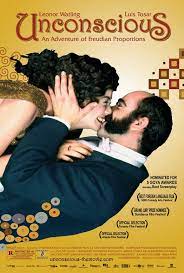
INCONSCIENTES/ UNCONSCIOUS
Spain, 2004, 108 minutes, Colour.
Leonor Watling, Luis Tosar, Mercedes Sampietro, Juanjo Pulgcorbe.
Directed by Joaquin Orristrell.
This is a very funny film with quite a lot to say about psychology and human behaviour. It is set in Barcelona, 2013, highlighting the importance of the impact of Dr Sigmund Freud (and a joke about a lecture by Dr Alzheimer who can’t remember anything).
The film is written as a farce and to be responded to as farce rather than realism – although, there is obviously a depth of realism underlying the farce. There are many funny situations. A lot of funny and clever dialogue with all kinds of psychological references.
And, there are many characters, whose lives are intertwined. There is the doctor who runs the hospital, with two daughters, each of them married to a doctor who works at the hospital. He favours one of his sons-in-law over the other, and employers one daughter as a translator.
The film opens with a nine-month pregnant, Alma, Leonor Watling, seeing her doctor husband, Leon, leaving the house unexpectedly. Alma employs her brother-in-law, Salvador (Luis Tosar) to help her search for her husband who has just returned, in fact, from a visit to Vienna and Freud. All kinds of strange things happen during the search, including Salvador and self-hypnosis, realisation that he is in love with Alma, some embarrassing sexual aspects of his life, the discovery of his cold wife being lesbian and visiting a transvestite club…
With the reappearance of Leon, they discover his manuscripts and various cases of women that has been exploring in Freudian perspectives, including the back of a barn which is used for pornographic filmmaking, a bordello, a woman with a secret… All dramatised in their way.
Salvador is so incensed against Freud that he plans to assassinate him when he visits Barcelona but the attempt is thwarted, a chandelier falling on the head doctor and Leon, a revelation that his daughter was born of an affair with his made – leading to the relationship between Alma and Salvador as incestuous.
Can be taken seriously – but not too seriously!
- The title? Psychological unconscious? Discussions about Freud and his theories, 1913, the various cases and theses, and the final appearance of Freud?
- The comic style, re-creating the period, 1913, costumes and decor, hospitals and treatment, vehicles, medical meetings, silent porn films, mixed gender clubs…? Spanish sense of humour? French style sex issues? British comedy, understatement, quips?
- The use of the silent film style, the framing, the titles, the editing and pace?
- Alma’s story, pregnant, her anxiety about her husband, someone on the stairs, his disappearance, coming to see Salvador, at the gym, his being knocked down, her anxiety, persuading him to come home, to find her husband? The maid, elderly, drinking, sardonic, comments?
- The family situation, the father, medical, employing his two sons in law, presiding at meetings, the humour with Dr Al Sima and his forgetting the contents of his speech, Alma translating? Olivia, tension with Salvador? Her visit to Alma, her talking about her husband and sexuality, his overhearing? Later at the gym, the men in showers, Alma intruding?
- The tension between Salvador and Olivia, the sexual scene? The later revelation is?
- Olivia, urging on Salvador to get the job, her father giving it to Leon? The thesis, on emotions, Salvador and the critique of emotions?
- The contrast with Leon, his four cases of women with hysteria, going through the cases: the prostitute and her relationship with the King, the locket, her being blackmailed, Leon delivering the money and the wrecked car, her films, Leon in the film, Salvador visiting, Alma on guard, the misinterpretation of his presence, urging a rehearsal for the film, the gunshot, his being stabbed with the scissors, finding out the truth? The second case of the nervous woman in the cell, Alma’s visit, the discussion about the Brontë sisters and books? The third case, his being revealed that it was Olivia?
- The lines of dialogue, deadpan, quips, local references of the time, pre-World War II one, all the inventions at the time, crossword puzzles and bras, reference to the Titanic? The further references at the end, changes and developments? Joke about the assassination threat to Freud and his asking whether it was a disciple of Jung!
- The hypnosis scene, Salvador hypnotising itself, Alma unable to break it, his declarations, the surfacing of all his unconscious, his coming to the restaurant, with Olivia and her father, the waiter and his loud clapping, Salvador and his embarrassment?
- The doctor, his tumour on the brain, the revelation of his relationship with the prostitute, her being the maid, Leon’s mother, the discovery of the incest theme with Freudian overtones, the brother marrying the sister, the baby and its birth?
- The information about the club, Alma and Salvador visiting, having to change clothes, the cross and dresses, the gender issues, sexual orientation, the truth about Leon, the truth about Olivia, her relationship, the confrontation, her leaving for Paris with her partner? The references to Paris and writers and painters?
- Leon, emerging, with Salvador, tying him up, the revelation of the truth, his plan to assassinate Freud? Going to the meeting, Freud and his arrival, manner, Alma translating, the talk, on taboos and am pronouncing it aboos?
- Leon’s arrival, the confrontation, the father shielding Freud? Salvador at the brothel, the deaf mute girl, illiterate? Breaking free, arriving at the conference, attacking Leon? The firing of the gun, the doctor being wounded? Freud saved?
- The maid, the revelation of the truth, Alma and Salvador together, planning to go to Latin America, saying they would not take psychoanalysis, Salvador’s continued criticism of psychoanalysis and the unconscious? The Tango – at their reputation with psychoanalysis in Brazil?
- The multilayered comedy and references? And the underlying themes via farcical characters and situations?